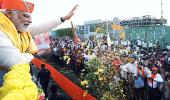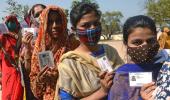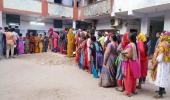The Election Commission would require an estimated Rs 10,000 crore every 15 years to procure new Electronic Voting Machines (EVMs) if simultaneous polls are held for Lok Sabha and assemblies, according to the poll body.

In a communication sent to the government, the commission noted that the shelf life of EVMs was 15 years and one set of machines could be used to conduct three cycles of elections in their life span if simultaneous polls were held.
According to estimates, a total of 11.80 lakh polling stations would be required to be set up across India for Lok Sabha polls this year.
During simultaneous polls, two sets of EVMs would be needed per polling station -- one for the Lok Sabha seat and another for assembly constituency.
Based on past experiences, the EC said in the communication sent to the government, certain percentage of Control Units (CUs), Ballot Units (BUs) and Voter-Verifiable Paper Audit Trail (VVPAT) machines are required as reserves to replace defective units at different stages, including on election day.
At least one BU, one CU and one VVPAT machine make up for one EVM.
Keeping in mind various aspects, the minimum EVMs and VVPATs required for simultaneous polls would be: 46,75,100 BUs, 33,63,300 CUs and 36,62,600 VVPATs, the Commission said in its letter to the Law Ministry in February last year.
In early 2023, the tentative cost of EVM stood at Rs 7,900 per BU, Rs 9,800 per CU and Rs 16,000 per unit of VVPAT.
The EC was responding to a questionnaire on simultaneous polls sent by the Law Ministry.
The poll panel also underlined the need for additional polling and security personnel, enhanced storage facilities for EVMs and more vehicles.
The commission said keeping in mind the production of new machines, increasing warehousing facilities and other logistical issues, the first simultaneous elections can only be held in 2029.
It also observed that five articles of the Constitution will need amendments to hold simultaneous polls to the Lok Sabha and state assemblies.
The provisions which would need amendment are Article 83 which related to the duration of Houses of Parliament, Article 85 relating to the dissolution of the Lok Sabha by the President, Article 172 relating to the duration of the state legislatures, Article 174 relating to the dissolution of the state legislatures, and Article 356 relating to the imposition of President's Rule in the states.
It also noted that the Tenth Schedule of the Constitution relating to disqualification on the grounds of defection will also require necessary changes.
The government has constituted a panel, headed by former president Ram Nath Kovind, to examine the issue of holding simultaneous elections in the country has been renamed.
The High Level Committee on One Nation, One Election has been tasked with examining and making recommendation for holding simultaneous elections to the Lok Sabha, state assemblies, municipalities and panchayats, keeping in view the existing framework under the Constitution of India and other statutory provisions.










